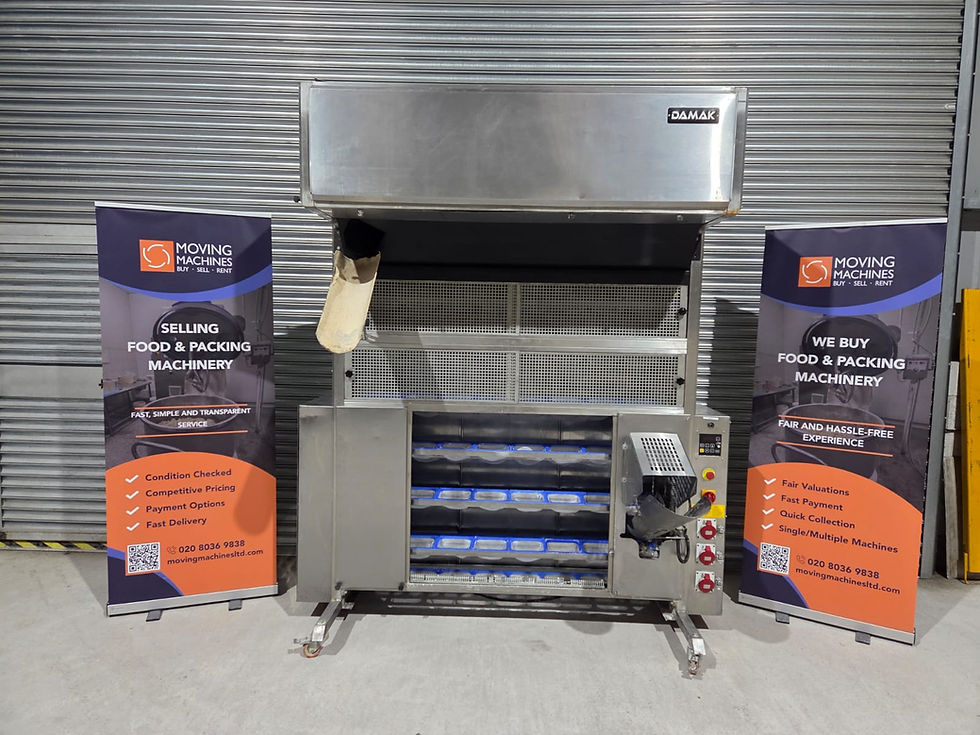Depositor Machines
About Depositors
Investing in a used industrial depositor can be a highly cost-effective way to enhance your production line, here’s a guide that covers the different types of industrial depositor machines, their common uses, and what to consider when procuring a pre-owned depositor for your business.
Understanding the Different Types of Depositor Machines
Depositors are precision instruments designed to dispense exact amounts of liquid, semi-liquid, or even chunky food products. Their versatility comes from various operating principles, each suited to different product viscosities and applications.
Piston/Volumetric Depositors
How they work: These machines use a piston to draw a precise volume of product into a cylinder and then expel it. The volume can be easily adjusted.
Typical uses: Highly accurate for a wide range of products, from thin liquids like sauces and oils to thick batters, jams, creams, and even products with small particulates (e.g., fruit pieces in yogurt, chocolate chips in batter). Excellent for ready meals, bakery fillings, and dairy products.
Key benefit: Exceptional accuracy and consistency.
Gearwheel (Gear Pump) Depositors
How they work: They utilise rotating gears to draw and push product through a nozzle. The speed of the gears controls the flow rate and volume.
Typical uses: Ideal for depositing smooth, consistent products like chocolate, glazes, icings, and thicker batters. They can also handle products with small inclusions if designed appropriately. Often used in confectionery and bakery decorating.
Key benefit: Continuous and precise flow, good for decorative applications.
Extruder Depositors
How they work: Force product through a die or nozzle to create specific shapes or continuous lengths. Often involve a screw or roller system.
Typical uses: Best for doughs, cookie batters (wire-cut, dropped), brownies, flapjacks, and some solid fillings. Can create various shapes and textures.
Key benefit: Versatility in shaping and forming products.
Spray/Waterfall Depositors
How they work: Apply a coating or topping over a product, either through a spraying mechanism or a continuous flow.
Typical uses: Glazing, enrobing, applying icing, chocolate coatings, or even sprinkling dry toppings like nuts or streusel onto cakes, biscuits, or pastries.
Key benefit: Even and efficient application of coatings and toppings.
Multi-Head Depositors
How they work: Can be any of the above types but feature multiple nozzles or dispensing points to deposit product simultaneously into multiple containers or across a wider area.
Typical uses: High-volume production lines for efficiency, filling multi-cavity trays, or applying multiple ingredients at once (e.g., dual-colour biscuits).
Key benefit: High throughput and increased production speed.

Key Questions to ask when looking for a used depositor
What specific products will this depositor be used for?
For products such as cake batter, hot sauce, jam with fruit pieces, cookie dough and hummus. Check requirements such as viscosity, temperature, and any particulates.
What is the minimum and maximum portion size you need to deposit?
Ensure the machine's volumetric range can accommodate your products.
What type of containers will you be depositing into?
Check that the depositor can handle your current requirements and it's versatility.
What is your required throughput (products per minute/hour)?
Confirm the machine's current capacity and if that aligns with your expectations.
Do you have the space?
If you are expanding production, checking the dimensions of the machine and how that will fit into operations will avoid any unexpected issues.

























